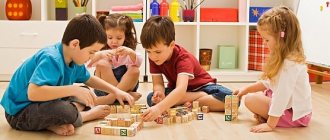Recommendations for teachers and parents on developing the communicative competence of preschoolers
Recommendations for parents
1. Let your child know that you accept him for who he is. Try to use expressions such as: “You are the most beloved,” “I love you anyway,” “What a blessing that we have you.”
2. Remember that every word, facial expressions, gestures, intonation, and volume of your voice convey to the child a message about his self-worth. Strive to create high self-esteem in your child, reinforcing this with the words: “I rejoice at your successes,” “You can do a lot.”
3. Pay attention to the fact that parents who say one thing and do another eventually experience disrespect from their children.
4. Before you start interacting with your child, try to position yourself so that you can see his eyes. In most cases you will have to squat down.
5. When communicating with your child, pay great attention to non-verbal (non-verbal) communication. So, instead of categorically saying the word “no,” try using a subtle gesture, glance or facial expression.
Saying without saying anything is the greatest art of parenting and demonstrates true and deep contact between parents and children. Try to express your attitude to the child’s behavior without unnecessary explanations or moralizing.
6. Strive to show full interest in the child during the communication process. Emphasize this with a nod or an exclamation. Don't be distracted while listening to him. Concentrate all your attention on it. Give him time to speak, do not rush him and do not emphasize with your appearance that you are no longer interested in this.
7. Don't tell your child anything you don't really want. Remember that many of the attitudes they receive from you determine their behavior in the future.
8. When communicating with children, remember that the child has the right to vote in solving any problem. Therefore, try to consult with him, and do not make a decision only yourself.
9. Observe the principles of equality and cooperation with children.
10. Do not allow your child to be alone with his experiences. Find time and contact him: “I see that something is bothering you,” “I see that someone has upset you,” “Tell me what’s wrong with you.”
11. Use a variety of speech formulas (farewells, greetings, thanks) when communicating with children. Don’t forget to greet your child in the morning and wish him “good night” in the evening. Say your words with a smile, a friendly tone, and accompany them with tactile touch. Be sure to, at least for a small service provided by your child, do not forget to thank him.
12. Try to respond adequately to the actions of children:
- try to understand the child and find out what was the motivation for his actions; try to delve into his experiences;
- evaluate not the child’s personality, but the action he performed. For example, a child breaks a cup and you can immediately hear: “Oh, you scoundrel, you broke the cup again!” The most appropriate expression would be: “Son, you broke the cup. Didn't you cut yourself? Please bring me a broom and a dustpan, and together we will remove the fragments.” And to prevent this from happening again, this incident can be used as teaching by telling the child: “I think the cup broke because you were holding it incorrectly”;
- make it clear to your child that regardless of the action, you have a positive attitude towards him;
- do not compare your child with other children.
13. Try not to use phrases in your speech that remain in the child’s mind for a long time: “I’m busy right now,” “How many times have I told you!”, “You always get involved in everything,” “What would you do without me?” did."
14. In order to properly organize relationships with children in the process of communication, strive to overcome:
- employment barrier (you are constantly busy with work, household chores);
- barrier of adulthood (you do not feel the child’s experiences, do not understand his needs);
- the barrier of “educational traditions” (you do not take into account the changed situations of upbringing and the level of development of the child, trying to duplicate the pedagogical influences of your parents);
- barrier of “didacticism” (you are constantly trying to teach children).
15.Improve your children's communication skills:
- to develop the ability to listen carefully and not interrupt your interlocutor, remind him: “First listen to what others are saying, and then speak yourself”;
- if a child forgets to say speech etiquette formulas (greetings, farewells, thanks), then indirectly remind him of this;
- to develop the ability to establish contact with an interlocutor, offer children a game situation: “Let’s compliment each other”;
- To develop the ability to communicate without words, offer them the games “Through the Glass”, “Foreigner”, “Tell Poems with Your Hands”. Try communicating using facial expressions and gestures for 15 minutes;
- To develop the ability to understand the mood and feelings of another, invite your child to watch one of their relatives. Offer children the games “What is your mood like?”, “Draw your fear and conquer it”;
- To develop a sense of empathy (sympathy) in children, use the plots of fairy tales. Try to find out from the children: is a fairy tale good or bad? What's good about a fairy tale? Are there any good heroes? Name it. Are there any bad ones? Who are they? Why are they bad? What good can happen to fairy-tale characters? What's bad? Try to read and always discuss fairy tales.
- Invite the children to write:
a) a fairy tale in a new way (an old fairy tale is taken as the basis, but the heroes can be endowed with opposite qualities);
b) salad from fairy tales (several fairy tales are combined into one);
c) continue the tale or come up with a new ending.
Memo for parents
Soon you and your child will have to start a new life. In order for the child to enter it joyful, sociable, and matured, we would like to offer a number of recommendations:
Try to create a calm, friendly atmosphere in the family.
- Set clear expectations for your child and be consistent in presenting them.
- Be patient.
- Build your child’s self-care and personal hygiene skills.
- Encourage games with other children and expand your social circle with adults.
- When your child talks to you, listen carefully.
- If you see a child doing something, start a “parallel conversation” (comment on his actions).
- Speak to your child in short phrases, slowly; in a conversation, name as many objects as possible. Give simple and clear explanations.
- Ask your child: “What are you doing?”
- Read to your child every day. Make sure he has new experiences.
- Engage in creative activities with your child: play, sculpt, draw...
- Encourage curiosity.
- Don't be stingy with praise.
ENJOY YOUR CHILD!!!
Recommendations for teachers
1. Be sure to establish personal contact with children:
- address by name;
- take a position at the child’s eye level;
- use tactile touch (however, remember that patting a child on the head or placing your hand on his head can cause negative reactions, even stress, in some children).
2. Try to listen to your children until the end, even if you have little time. Try not to interrupt the child. Analyze your behavior.
- Are you always able to listen to your child until the end?
- Is there a desire to interrupt him?
- Do you find yourself thinking that something the child is talking about is unimportant, trivial?
- Make sure that during your child’s statements you are not conducting an internal debate with him, expressing this in facial expressions and gestures.
3. Watch your own speech. Remember that it is a reflection of your personality. Analyze your own speech:
- eliminate shouts and harsh intonations from your speech, which negatively affect children, causing emotional discomfort;
- pay attention to intonation, remember that correctly placed intonation accents affect the quality of perceived information and the general psychological microclimate;
- try to get rid of words - “parasites” (“well”, “means”, “in general”, etc.)
4. Remember that a preschool child is a non-verbal being, so all information is better absorbed by him not through words, but through relationships. Try to use such a non-verbal method of interaction with children as “demonstration of affection”: calm attention, smile, eye contact, encouraging gesture, affectionate touch, stroking.
5. When organizing communication with children, try to understand their mood. Develop pedagogical observation. Observe: in what mood the child came to the preschool educational institution; Does he tell other children about his emotional mood and feelings?
6. Smile at children more often while interacting with them, this contributes to a favorable psychological microclimate. Watch yourself:
- how often do you smile at your children?
- Are you able to laugh with your children?
- How often does your face express fatigue and concern?
7. Learn to see yourself from the outside:
- analyze your own activities more often;
- strive to put yourself in the child’s place;
- develop the ability to admit your mistakes in communicating with children.
8. When communicating with children, use pedagogical techniques such as suggestion and persuasion. To convince you you need:
- be yourself convinced of what you are talking about;
- present arguments clearly and understandably to children;
- show restraint and patience.
When using suggestive instruction, you need to speak in the most commanding tone possible and at the same time look expressively into the child's eyes.
9. Be especially careful about your behavior, manners, and gestures. Remember that preschool children are characterized by high imitation.
10. Choose the right tactics of behavior when communicating with children when resolving a conflict situation. Remember: you have no professional right to be offended by children. Try to evaluate the deed, the action that the child performed, and not his personality. Show that you are unhappy with the action, but you yourself have a positive attitude towards the child. Avoid the following techniques to help resolve children's quarrels and fights:
- demands (“don’t interfere”, “stop quarreling”);
- punishments (deprivation of toys, isolation from the team);
- assessments that carry the character of irony (“well, I knew that Petrov did it again”);
- indignation (“just look what you’ve done!”);
- anticipatory negative assessment (“you’ll never get anything good from you!”);
- questions to the children: “Who destroyed the building?”, “Who hit?”.
Try to resolve the conflict in a friendly tone, without raising your voice. Let your child understand that if you punish him, this does not mean that your previous attitude towards him has changed. Use the following techniques:
- anticipatory assessment (“I’m sure you won’t do that again”);
- orientation towards the children themselves (“I think that you yourself will try to understand which of you is to blame”);
- finding out the motive for the child’s unfair attitude towards his peer (“Why did you do this?”, “Tell me how it happened”);
- explanation (“I’ll tell you now what happened”).
11. Know how to analyze the communication process. Try to find the reasons for mistakes in interacting with children. It can be:
- misunderstanding of the psychological situation and mood of children;
- insufficient self-regulation;
- discrepancy between your communication style, your individual atmosphere in the group of children, and the existing level of relationships in the group;
- mechanical copying of colleagues’ communication style.



